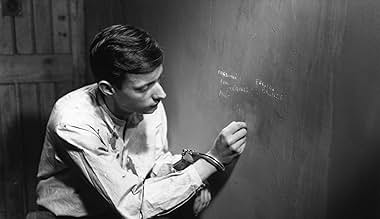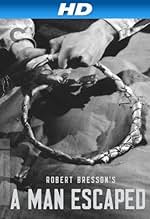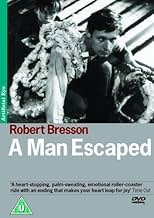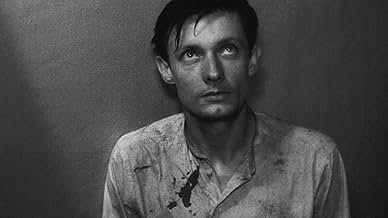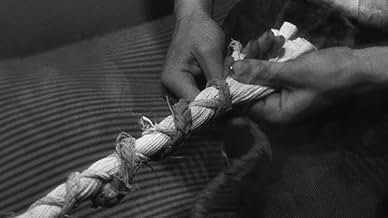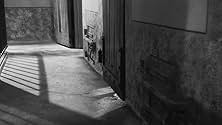Um Condenado à Morte Escapou
Título original: Un condamné à mort s'est échappé ou Le vent souffle où il veut
AVALIAÇÃO DA IMDb
8,2/10
30 mil
SUA AVALIAÇÃO
Um soldado da Resistência Francesa capturado durante a Segunda Guerra Mundial projeta uma fuga assustadora de uma prisão nazista na França.Um soldado da Resistência Francesa capturado durante a Segunda Guerra Mundial projeta uma fuga assustadora de uma prisão nazista na França.Um soldado da Resistência Francesa capturado durante a Segunda Guerra Mundial projeta uma fuga assustadora de uma prisão nazista na França.
- Direção
- Roteiristas
- Artistas
- Indicado para 1 prêmio BAFTA
- 4 vitórias e 3 indicações no total
César Gattegno
- Le prisonnier X
- (não creditado)
Max Schoendorff
- Un soldat allemand
- (não creditado)
Resumo
Reviewers say 'A Man Escaped' is lauded for its minimalist style and intense focus on escape from a Nazi prison. Bresson's direction, sparse dialogue, and use of non-professional actors are praised. The deliberate pacing builds suspense and immerses viewers. Some appreciate its authenticity, while others find it less engaging. Leterrien's performance is noted for realism, but opinions vary on its accessibility and emotional impact.
Avaliações em destaque
Pages and pages of film criticism could be, and most likely have been, written about this film, so I will just include my simple wholehearted recommendation, in the hopes that whoever is reading this will seek out "A Man Escaped" immediately. I can think of few films with a simpler premise and plot line - it really is only about an anonymous man in prison attempting to escape. That's it. Yet, director Robert Bresson, more than any other director I can think of (with the exception of Yasujiro Ozu), can imbue the drab everyday details of life with life-and-death importance. This director could make a movie about a guy tying his shoes into a riveting cinematic experience. His style of film-making is completely unobtrusive and restrained, because he has figured out a simple truth that about 95% of all film directors never realize: the less a director tries to "push" his ideas through a film, ironically, the greater the range of ideas he is able to elicit in his audience. You bring to this movie whatever life experience and ideas you carry with you; an older child as well as an aging philosophy professor can enjoy this film equally, and for very different reasons. In addition, I believe this is also the most realistic film that I have ever seen. It takes the skill of a master to make reality into great cinema, and this film is one of Bresson's greatest. It could even be his greatest, because though his other films "Au Hasard Balthazar" and "Pickpocket" are great masterpieces, they can never have the same kind of accessibility to virtually any living person in the world as this has.
I hit an impasse with Bresson's previous film, Diary; he used a peculiar conflation of a search for transparent truth in the mysteries of life with anguish and dejection as romanticized spiritual journey, romanticized in the Christian sense where it's not spiritual if it doesn't have anguish. It seemed crude and without enlightenment.
The impasse was; was the pious young priest for Bresson another person among others in the village led astray in the effort to rationalize his emotions, or was he above them, an ideal to aspire to? This was more interesting to me than the film itself.
So I came to this hoping for the fresh light of retrospect. And what a stark contrast this is! Another idealistic young man who suffers torments, physical and inner, another life of anguish in four walls. But here Bresson draws the breath in, quiets the anguish, accepts the fact of it, and works to concentrate the senses and create physical presence. We've come far in our ability to do this, but it still resonates.
The film is practically a long suspense piece, with a few questions about ethics suspended briefly. The man here, by contrast to the priest, simply does the work he sets out before him. He doesn't perceive himself a martyr of his cause, or a quiet sufferer of wrongs, he simply abides and prepares for the long night. His idealism waits to be found out until near the end when the charges against him are laid out; sabotage.
It's fine work, easy to parse. It doesn't answer the impasse mentioned above so for that I'll have to go to his next one.
The impasse was; was the pious young priest for Bresson another person among others in the village led astray in the effort to rationalize his emotions, or was he above them, an ideal to aspire to? This was more interesting to me than the film itself.
So I came to this hoping for the fresh light of retrospect. And what a stark contrast this is! Another idealistic young man who suffers torments, physical and inner, another life of anguish in four walls. But here Bresson draws the breath in, quiets the anguish, accepts the fact of it, and works to concentrate the senses and create physical presence. We've come far in our ability to do this, but it still resonates.
The film is practically a long suspense piece, with a few questions about ethics suspended briefly. The man here, by contrast to the priest, simply does the work he sets out before him. He doesn't perceive himself a martyr of his cause, or a quiet sufferer of wrongs, he simply abides and prepares for the long night. His idealism waits to be found out until near the end when the charges against him are laid out; sabotage.
It's fine work, easy to parse. It doesn't answer the impasse mentioned above so for that I'll have to go to his next one.
10allyjack
Was there ever a sparer, more concentrated film? The painstaking focus on the ritual-like preparation for the escape is almost wrenching in its calm severity; yet always graceful, always fluid. The details of the final escape make for one of the most memorable sequences in cinema - interspersed with episodes of doubt in which he falters for hours or more before taking the next step, just as he delays the escape itself for many days even though he knows his execution is imminent. It's almost like a sombre dance with death, or at least a morally exacting examination of one's limits and a fear of the transcendent (which in this case is represented merely by freedom itself). There are no moments of light relief or variation here, just an attention to process and causality - the concentration on the plan almost becomes a means of redemption, until carrying out the plan becomes almost superfluous if not destructive. Of all Bresson's films, this is the one that best engages on a thematic level while simultaneously working as narrative - his distilled gravity constitutes a fantastically effective suspense mechanism; a model of tight storytelling.
This is one superior made movie. I don't know what it as about prison movies but they often work out as such great ones. This one manages to be original as well, due to its approach and just overall execution of it all.
It's perhaps that we really start to feel and identify for and with the main character, in a prison movie. We get to see the restrained and strict world he lives in through his eyes and we can hear what he is hearing and almost feel what he is feeling because we as the viewer are so close up to him. In this movie this is even more the case than ever. The story is being told completely from his perspective and also features his narration over the sequences. It makes the movie really an effective one. It of course also helps the movie and story that we can root for the main character, since he is a member of the French resistance that got caught and held in prison by the Nazi's, during WW II. We only see what he sees and only hear what he hears. And this movie uses takes great advantage of this approach. I especially liked the incredible use of sound throughout the movie.
But the movie does not only use a great approach, it also manages to build up its story extremely well. I just love how he plan his escape in tiny steps throughout the movie. He picks up up an item here, makes a tool there, sends and gets some information here, studies the guards movements there and takes just tiny steps every time to get closer to his breakout from jail. It's incredible how well and intriguing this works out all for the movie. Fore the movie and its story itself are actually being quite simplistic. This is not an high budget movie and uses limited resources to tell its story with.
It's also one of those movies that uses non-professional actors, to add to the movie its realism. This is a thing that was popular for a while with Italian and French film-makers. It did not always worked out too well for just every movie but in this case you can't really complain about it. The characters simply work out, so the acting was convincing and realistic.
This is such a great minimalistic movie. It does incredibly well with its simplistic story and concept and picks a wonderful, effective approach to it all.
9/10
http://bobafett1138.blogspot.com/
It's perhaps that we really start to feel and identify for and with the main character, in a prison movie. We get to see the restrained and strict world he lives in through his eyes and we can hear what he is hearing and almost feel what he is feeling because we as the viewer are so close up to him. In this movie this is even more the case than ever. The story is being told completely from his perspective and also features his narration over the sequences. It makes the movie really an effective one. It of course also helps the movie and story that we can root for the main character, since he is a member of the French resistance that got caught and held in prison by the Nazi's, during WW II. We only see what he sees and only hear what he hears. And this movie uses takes great advantage of this approach. I especially liked the incredible use of sound throughout the movie.
But the movie does not only use a great approach, it also manages to build up its story extremely well. I just love how he plan his escape in tiny steps throughout the movie. He picks up up an item here, makes a tool there, sends and gets some information here, studies the guards movements there and takes just tiny steps every time to get closer to his breakout from jail. It's incredible how well and intriguing this works out all for the movie. Fore the movie and its story itself are actually being quite simplistic. This is not an high budget movie and uses limited resources to tell its story with.
It's also one of those movies that uses non-professional actors, to add to the movie its realism. This is a thing that was popular for a while with Italian and French film-makers. It did not always worked out too well for just every movie but in this case you can't really complain about it. The characters simply work out, so the acting was convincing and realistic.
This is such a great minimalistic movie. It does incredibly well with its simplistic story and concept and picks a wonderful, effective approach to it all.
9/10
http://bobafett1138.blogspot.com/
This movie, perhaps above all others, exemplifies just how important sound is in cinema. In fact, sounds (excluding dialogue) help carry the plot as much as the visuals and dialogue.
The crunching of the gravel under their feet really creates a sense of realism to the story. If you or I were escaping from prison, all the sounds Fontaine must pay attention to we must as well.
I doubt you'll find this film at your local video store, but I encourage everyone to check it out. It's like the Shawshank of the 1950s.
The crunching of the gravel under their feet really creates a sense of realism to the story. If you or I were escaping from prison, all the sounds Fontaine must pay attention to we must as well.
I doubt you'll find this film at your local video store, but I encourage everyone to check it out. It's like the Shawshank of the 1950s.
Você sabia?
- CuriosidadesAfter seeing the film, Jean-Luc Godard said that Robert Bresson was "to French cinema what Wolfgang Amadeus Mozart is to German music and Fyodor Dostoevsky is to Russian literature".
- Citações
Le lieutenant Fontaine: I think my courage abandoned me for a moment and I cried.
- Versões alternativasAfter the "Fin" title card, there is a version that plays music to a black screen, while another version displays "Exit Music" in white letters against the black screen.
- ConexõesFeatured in De weg naar Bresson (1984)
- Trilhas sonorasGreat Mass in C Minor, No.16 (K.427) - Kyrie
Written by Wolfgang Amadeus Mozart
Principais escolhas
Faça login para avaliar e ver a lista de recomendações personalizadas
- How long is A Man Escaped?Fornecido pela Alexa
Detalhes
- Data de lançamento
- País de origem
- Idiomas
- Também conhecido como
- A Man Escaped
- Locações de filme
- Empresas de produção
- Consulte mais créditos da empresa na IMDbPro
- Tempo de duração
- 1 h 41 min(101 min)
- Cor
- Proporção
- 1.37 : 1
Contribua para esta página
Sugerir uma alteração ou adicionar conteúdo ausente


